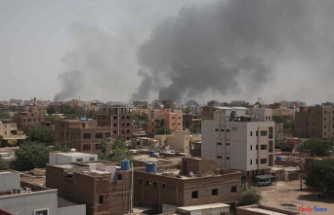Russia announced Thursday, March 30, the arrest for "espionage" of an American journalist from the daily Wall Street Journal, Evan Gershkovich, an unprecedented case in the recent history of the country in a context of repression since the offensive against Ukraine.
He is "suspected of spying for the benefit of the United States" and of collecting information "about a Russian military-industrial complex company". A crime punishable by ten to twenty years in prison, according to article 276 of the Russian criminal code.
Russian diplomacy claimed that the American journalist had been caught "hand in the bag". "What the contributor to the American publication 'Wall Street Journal' was doing in Yekaterinburg had nothing to do with journalism," said Russian diplomatic spokeswoman Maria Zakharova on Telegram.
She added that the reporter was "not the first famous Westerner to be caught red-handed" and that others had "used 'foreign correspondent' status for the purpose of covering their activities".
The Wall Street Journal, which "vehemently denies" the espionage charges, said in a statement Thursday that it was "deeply concerned for the safety" of its journalist arrested in Russia.
The Kremlin on Thursday warned Washington against any form of reprisals targeting Russian media working in the United States. "We hope there won't be, and there shouldn't be," Kremlin spokesman Dmitry Peskov told reporters when asked about the possibility that Russian media outlets in the United States are subject to verification.
Legislation against espionage toughened
Before joining the American daily in 2022, Mr. Gershkovich was a correspondent for Agence France-Presse (AFP) in Moscow, and before that, for the English-language newspaper Moscow Times. Perfectly Russian-speaking, the 31-year-old journalist is of Russian origin and his parents are settled in the United States.
The R.Politik analysis center notes that Russia has recently tightened its laws against espionage since it invaded Ukraine. “The problem is that the new Russian legislation (…) makes it possible to put in prison for twenty years anyone interested in military affairs, in the “special military operation”, in private military groups [like Wagner], in the state of the army. Russia's Federal Security Service (FSB) could have taken the journalist "hostage" for a possible prisoner exchange.
Russian-American exchanges have taken place a few times in recent years. Several American nationals are still detained in Russia, one of whom, Paul Whelan, is serving a sixteen-year prison sentence for "espionage" in a case that the person concerned and Washington consider fabricated. He was arrested in 2018 and negotiations have been ongoing for several years to have him released. The 53-year-old ex-soldier suffers, according to his family, from health problems in his prison, located in the Russian region of Mordovia.
Repression of the opposition and independent media
The latest exchange between Moscow and Washington took place in December when Russia handed over American basketball player Brittney Griner, detained for drug trafficking, in exchange for the release of arms trafficker Victor Bout who is incarcerated in the United States.
Another American currently being held in Russia, Marc Fogel, a former diplomat who worked as a teacher at an American school in Moscow. He was sentenced in June 2022 to fourteen years in prison for "large-scale" cannabis trafficking. Russian authorities claimed to have found marijuana and hashish oil in his luggage during a customs check upon his arrival at Sheremetyevo airport in Moscow.
If the Russian press and journalists critical of the Kremlin are often the target of criminal proceedings in Russia, foreign journalists have been spared, Moscow having preferred to expel correspondents and toughen accreditation rules.
Since the launch of the Russian offensive against Ukraine, however, the Russian authorities have accelerated their repression of the opposition and independent media, generally using provisions of the criminal code punishing the act of "discrediting the army".
At the same time, for foreign journalists, the conditions for issuing accreditations, on which visas depend, have been tightened. Foreign reporters are also sometimes followed by the FSB during their reporting, especially outside Moscow. In this context, many Western media have greatly reduced their presence in Russia since the entry of Russian forces into Ukraine in February 2022.












